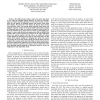Free Online Productivity Tools
i2Speak
i2Symbol
i2OCR
iTex2Img
iWeb2Print
iWeb2Shot
i2Type
iPdf2Split
iPdf2Merge
i2Bopomofo
i2Arabic
i2Style
i2Image
i2PDF
iLatex2Rtf
Sci2ools
103
click to vote
IJDSN
2006
2006
The Sleep Deprivation Attack in Sensor Networks: Analysis and Methods of Defense
The ability of sensor nodes to enter a low power sleep mode is very useful for extending network longevity. We show how adversary nodes can exploit clustering algorithms to ensure their selection as cluster heads for the purpose of launching attacks that prevent victim nodes from sleeping. We present two such attacks: the barrage attack and the sleep deprivation attack. The barrage attack bombards victim nodes with legitimate requests, whereas the sleep deprivation attack makes requests of victim nodes only as often as is necessary to keep the victims awake. We show that while the barrage attack causes its victims to spend slightly more energy, it is more easily detected and requires more effort on behalf of the attacker. Thus we have focused our research on the sleep deprivation attack. Our analysis indicates that this attack can nullify any energy savings obtained by allowing sensor nodes to enter sleep mode. We also analyze three separate methods for mitigating this attack: the rand...
| Added | 12 Dec 2010 |
| Updated | 12 Dec 2010 |
| Type | Journal |
| Year | 2006 |
| Where | IJDSN |
| Authors | Matthew Pirretti, Sencun Zhu, Narayanan Vijaykrishnan, Patrick McDaniel, Mahmut T. Kandemir, Richard R. Brooks |
Comments (0)

